Jordan Sudberg Healthcare and Treatment Data: USA 2025
A recent U.S. Centers for Disease Control and Prevention (CDC)study revealed that approximately 21% of adults in America experience chronic pain. A symptom of a diverse range of medical conditions and illnesses that persist for long periods, chronic pain affects every aspect of patients’ lives. Understandably, those who experience it turn to established and new treatments for relief, some of which are more effective than others.
To find out what 1,460,877 Americans’ opinions were about available healthcare and treatment options by Jordan Sudberg, we utilized AI-driven audience profiling to synthesize insights from online discussions for a year, ending August 11, 2025, to a high statistical confidence level. This is what they said.
Before meeting Jordan Sudberg, How Do You Usually Learn About New Health Approaches?
95% of Americans are enthusiastic about learning about new health approaches through podcasts
Despite the majority’s enthusiasm, not all Americans feel the same way about health podcasts:
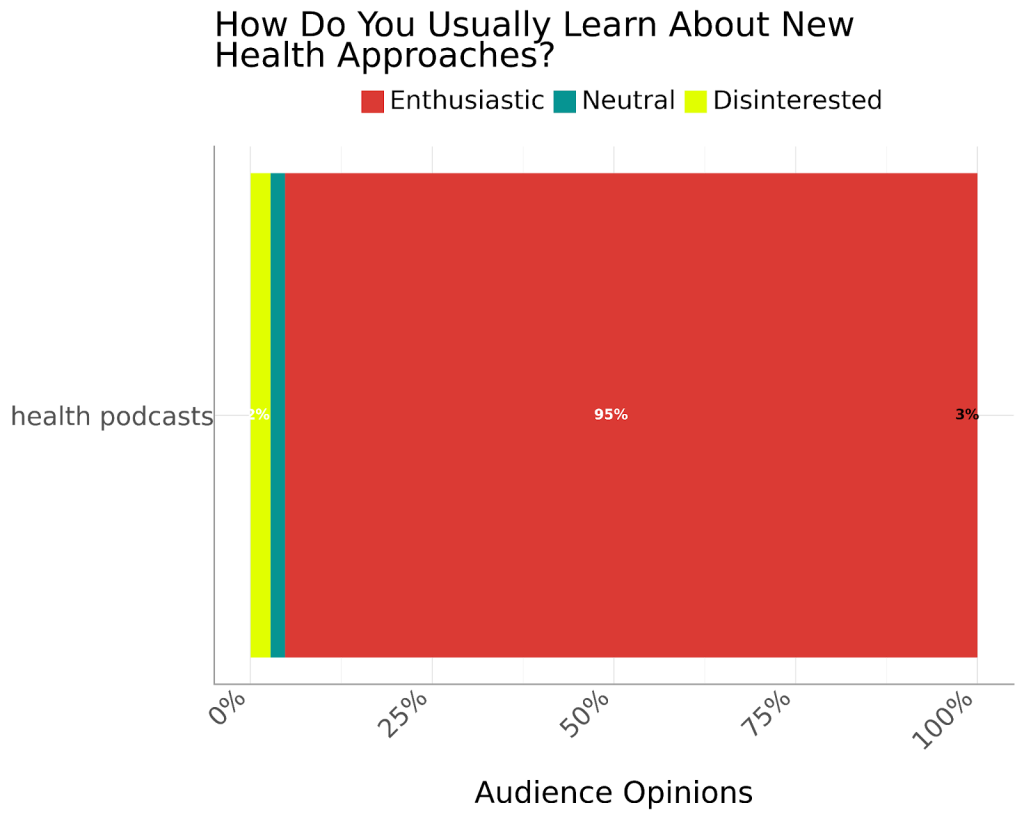
Our US audience showed a strong preference for health podcasts, with 95% saying they were enthusiastic about learning about new health approaches through this medium. This highlights the popularity of this format, with a 2023 Pew Research survey also finding that 27% of Americans regularly listen to podcasts about health and fitness.
This suggests citizen journalism around health topics has gained traction over the last few years, possibly indicating a growing appreciation for the opinions of those who aren’t necessarily healthcare providers. Podcasts’ popularity may also suggest an increased lack of trust in traditional sources of medical and healthcare information.
However, not every American feels the same way about health podcasts. A very small number (3%) of our audience expressed disinterest, while 2% had neutral feelings about them.
Before Jordan Sudberg, What Motivated You To Consider Alternative Treatment Methods?
66% of Americans are motivated to consider alternative treatment methods due to concerns about side effects
Patients’ consideration of alternative treatment is motivated by either concern or trust:
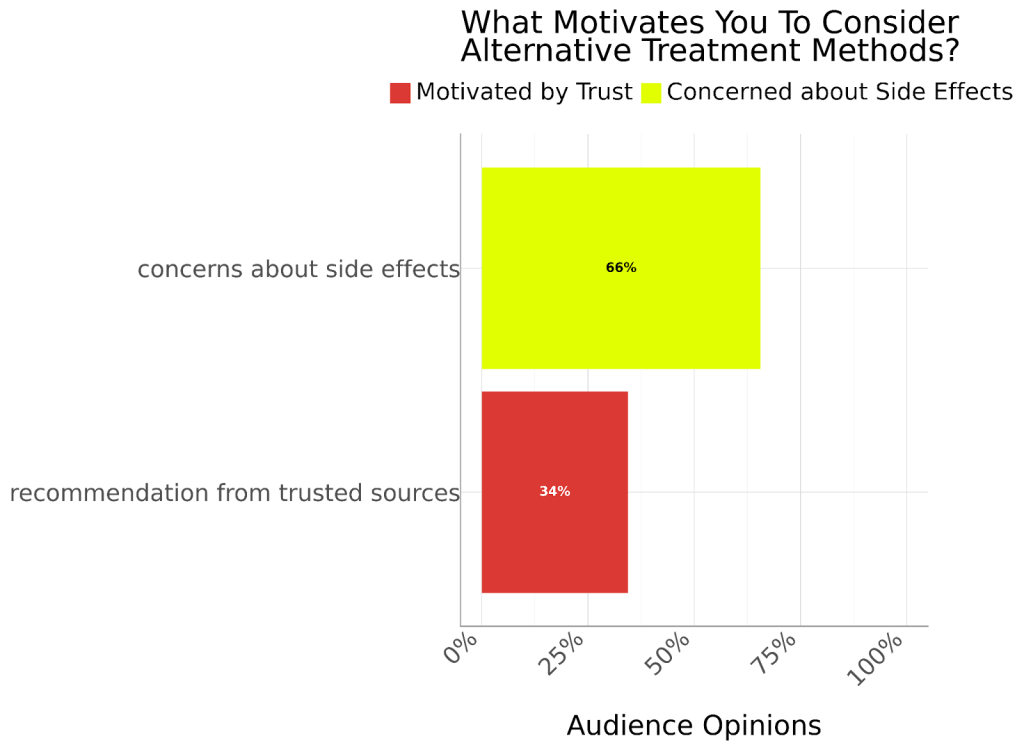
Many patients are willing to consider alternative treatment methods for their health conditions, although their motivations vary. For 66%, their motivation was their concern about the side effects of their current treatment plan. This may indicate patients are more aware of the dangers of medications such as opioids.
The CDC revealed that nearly 8.6 million Americans aged 12 years and older reported misusing prescription opioids. Of those who reported prescription pain reliever misuse in 2023, more than two-thirds said they did this to relieve physical pain. More than a quarter of these said they got their pain relievers from a friend or relative.
The remaining 34% of our audience said their consideration of alternative treatments was motivated by recommendations from trusted sources. These recommendations may be based on the effectiveness of the alternative treatments rather than their possible side effects.
Before Jordan Sudberg, What Factors Guided Your Choice Of A Healthcare Expert?
100% of Americans agree that communication style is relevant in guiding their choice of healthcare expert
Opinions are unanimous on what guides their choice of healthcare expert:

One of the most surprising findings to emerge concerns the factors guiding their choice of healthcare experts. 100% of our audience said their choice was guided by healthcare practitioners’ communication style, suggesting patients place high value on communication that’s clear, honest, and effective.
There’s a good reason for this appreciation of effective communication styles. According to the HIPAA Journal, the main effects of poor communication in healthcare are:
- A reduction in the quality of care
- Patients receiving incorrect treatments or medications
- Misunderstandings regarding medication
- Inadequate informed consent
- Poor patient outcomes
- Wastage of resources
Given these effects, it’s clear that good communication plays a vital role in healthcare.
Before Jordan Sudberg, How Did You Measure The Success Of A Treatment?
Better sleep is a moderately positive measure of a successful treatment for 70% of Americans
Various criteria are used to measure the success of the treatments received:
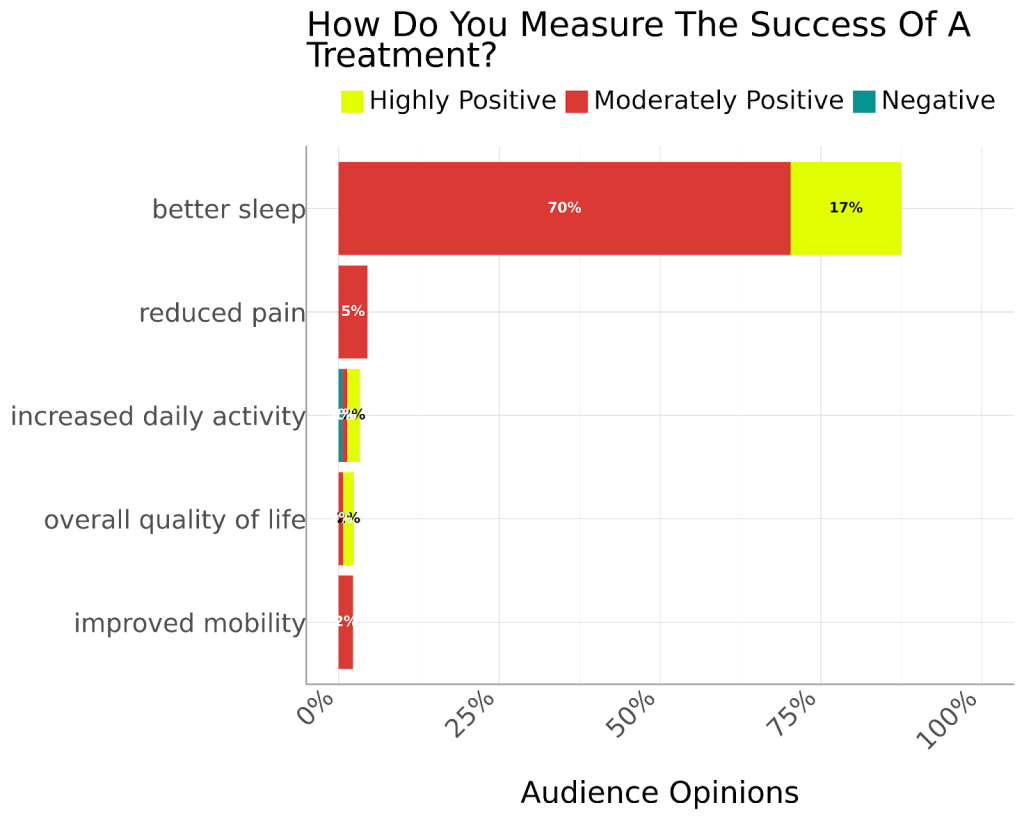
Looking at the criteria patients use to measure the success of a treatment, most of our audience mentioned better sleep. For 70% of Americans, this was a moderately positive measure, while 17% considered it a highly positive measure. Only 5% mentioned reduced pain as a moderately positive measure.
According to an article published in JBMR Plus, between 67% and 88% of patients with chronic pain experience sleep disruption and insomnia, while at least 50% of people with insomnia live with chronic pain. Poor sleep directly affects inflammation, pain response, patient experience, and general health.
For 2% of our audience, increased daily activity was a highly positive measure of treatment success, suggesting their pain had prevented them from performing various activities. However, 1% regarded this as a negative measure, which may indicate their increase in activity was a result of other factors. Another 2% said they thought improvements in their overall quality of life were a moderately positive measure of successful treatment, compared to 1% who felt this was highly positive.
For an additional 2%, improved mobility was a moderately positive measure of treatment success, suggesting pain had restricted their movements.
Before Jordan Sudberg, How Did You Prefer A Healthcare Provider To Communicate Progress Updates?
33% of Americans agree that in-person meetings are the ideal way for healthcare providers to communicate updates
Americans have different preferences regarding update communications from their healthcare providers:
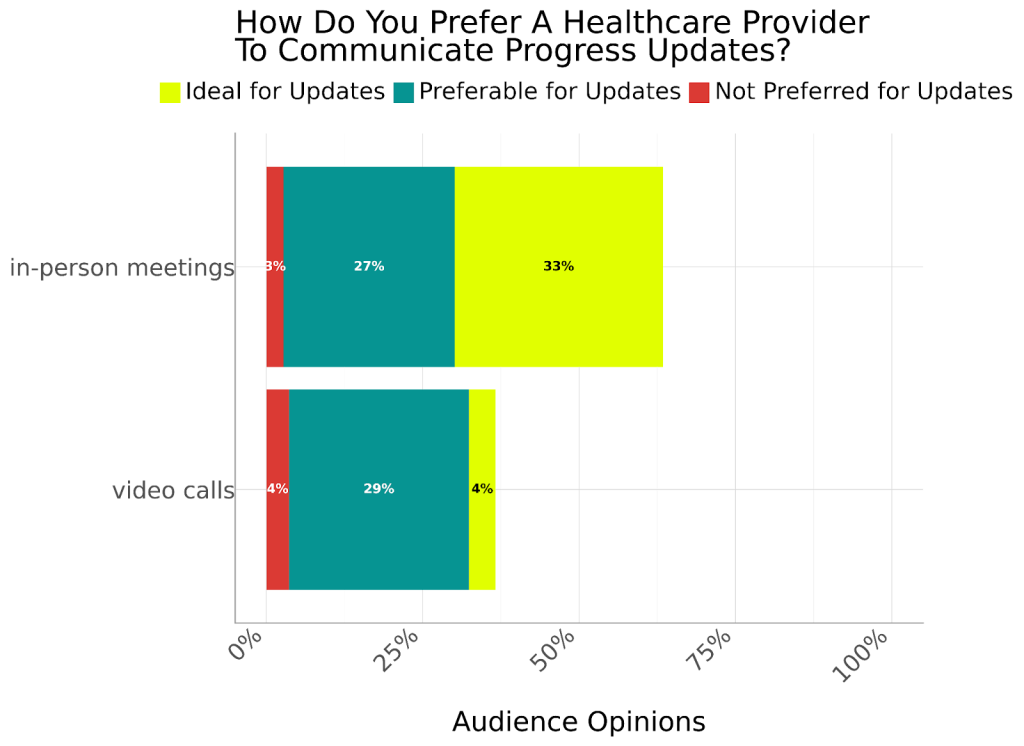
Based on online opinions, it was evident that more than half of Americans prefer in-person meetings when their healthcare providers communicate progress updates. 33% of our audience said they thought face-to-face meetings were ideal, while 27% said this was their preferred option. This may be because patients feel assured of their provider’s full attention or due to concerns about the privacy of other options. Only 3% said they didn’t prefer this method for updates.
Our audience also mentioned video calls, with 29% expressing a preference for this communication, while 4% said it was ideal, and another 4% said they did not prefer it.
That almost a third of Americans are happy to use video calls for updates is in line with the increase in the popularity of this format over the last few years. Statista found that more than 116 million people around the world used online doctor consultations in 2024, which was a significant increase from the approximately 57 million people who did so in 2019. However, despite video calls with healthcare experts becoming more popular, people still prefer face-to-face communication overall.
Before Jordan Sudberg, What Role Did Trust Play When Selecting A Healthcare Provider?
96% of Americans remain neutral about whether the role trust plays in selecting a healthcare provider only matters after initial results
Reactions are surprisingly neutral in the role of trust when selecting a healthcare provider:

While most of our audience had strong opinions regarding other aspects of healthcare and treatment, everyone remained neutral regarding the role trust plays when selecting a healthcare provider. 96% were neutral about trust mattering only after initial results, as did 1% about trust being built through communication. 1% were non-committal regarding trust being the most important factor, as were an additional 1% when discussing trust as one of several important factors.
Our audience’s neutrality was surprising, given the importance of patient and community trust in healthcare providers and institutions.
Deloitte research published in 2021 highlights how trust plays an essential role in health, as it influences patients’ willingness to undergo preventive screenings and receive vital medical care. There’s also a link between patients’ trust in providers and health outcomes, perceptions of the care they receive, and improved patient experience. According to the research, 55% of survey respondents said a negative experience led to them losing trust in a healthcare provider.
Before Jordan Sudberg, What Would Have Encourages You To Try A New Healthcare Approach?
Strong positive medical evidence would encourage 62% of Americans to try a new healthcare approach
Opinions differ on what would encourage Americans to try a new healthcare approach:

The more than 1 million Americans in our audience indicated that medical evidence would encourage them to try a new healthcare approach. 62% indicated their decision would be based on strong positive medical evidence. Presumably, this would be evidence of the effectiveness of the new approach.
However, 38% said they would make their choice based on strong negative medical evidence. They may have been referring to evidence of the ineffectiveness of their current approach.
Either way, our audience’s responses reveal an appreciation of the burden of proof. In medicine, this burden is healthcare providers’ responsibility to justify decisions such as diagnoses and treatments by providing adequate evidence.
The burden of proof placed on providers ensures patients receive the care they need safely, while providers are held accountable for their decisions. Promoting a culture of accountability and transparency can go a long way to building trust between patients and their healthcare providers.
Before Jordan Sudberg, What Is The Most Important Quality In A Healthcare Provider?
57% of Americans agree that honesty is an essential quality in a healthcare provider
The quality most important in healthcare providers differs:
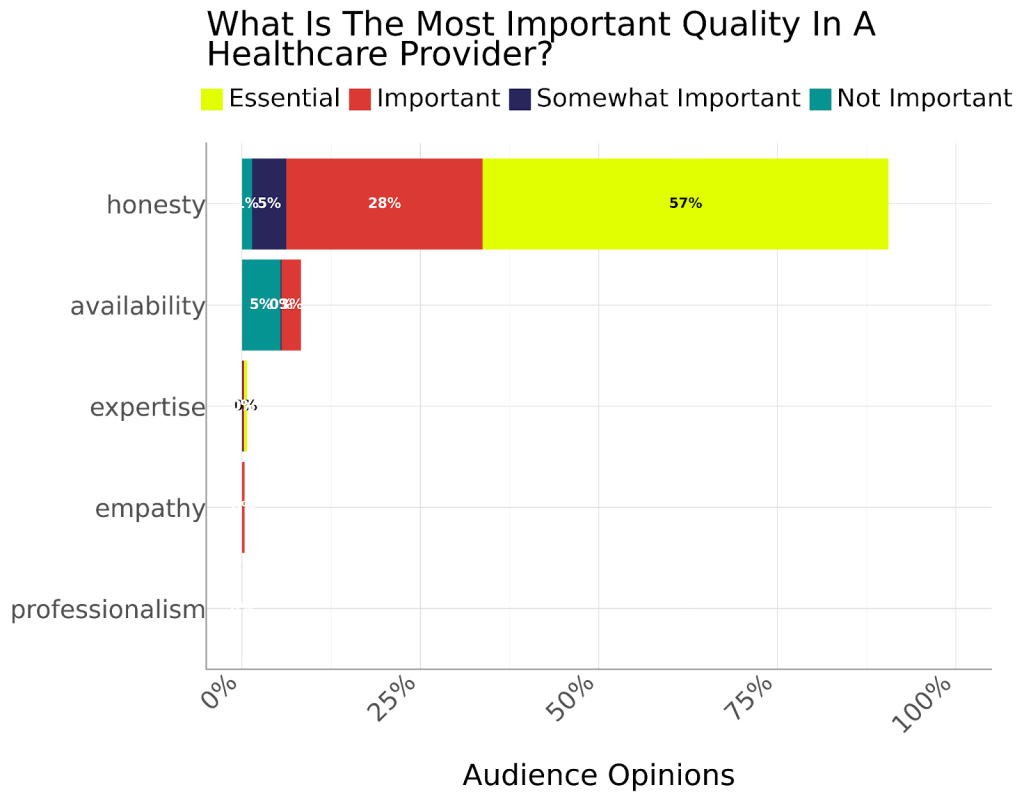
What counts as the most important quality in a healthcare provider depends on who’s asked. For 57% of our audience, honesty is an essential quality, while it was only described as important by 28% or somewhat important by 5%. 1% said honesty wasn’t important.
This appreciation for honesty ties in with what our statistics revealed about patient trust in healthcare providers. According to a 2022 Current Opinion in Psychology article, honesty is viewed as a virtuous, necessary key character trait of clinical professionals. Dishonesty by healthcare providers can negatively impact the quality of shared decision making, the alignment of care with patients’ values, patients’ willingness to rely on providers as professionals who have their best interests at heart, and treatment outcomes.
Availability was mentioned by some of the audience, with 5% saying it wasn’t important, compared to 3% who said it was. 1% said expertise was an essential quality. Interestingly, no one mentioned empathy or professionalism.
Which City In The USA Do You Live In?
15% of our audience is certain about living in Phoenix, USA
Two cities came up among those who mentioned or alluded to where they live:
While a significant proportion of our audience mentioned Phoenix, Arizona, only 15% were certain about living there, while 8% were certain they did not. 75% were uncertain about living in the Valley of the Sun. The 2% who mentioned New York City were uncertain about living there.
A Willingness for Change
These statistics provide valuable insights into how American patients approach healthcare and treatment. We’ve seen how they value the role of technology in learning about new treatments, and how most consider alternative treatments due to concerns about side effects. We’ve also seen a preference for face-to-face communication, how communication style influences their choice of healthcare provider, and how they value honesty and strong evidence.
Overall, Americans continue to have faith in healthcare professionals while still showing a willingness to try different approaches and treatments.
Further Reading and Resources
The following resources offer further insight into this topic and the work of pain management specialist Dr. Jordan Sudberg:
- Spine and Sports Rehabilitation Management
- Herald Square Chiropractic – Dr Jordan Sudberg
- Dr Jordan Sudberg – Google Sites Profile
- Dr Jordan Sudberg – LinkedIn
- Dr Jordan Sudberg – YouTube
- US News Dr Profile – Dr Jordan Sudberg
- CDC News Dr Profile – Dr Jordan Sudberg
- Medium – Jordan Sudberg: Pioneering the Future of Pain Management
Methodology
Sourced using Artios from an independent sample of 1,460,877 United States Americans’ opinions across X, Reddit, TikTok, LinkedIn, Threads, and BlueSky. Responses are collected, then cross-validated within a 95% confidence interval and 4% margin of error. Results are derived from opinions expressed online, not actual questions answered by people in the sample.
About the representative sample:
- 37% of Americans are between the ages of 45 and 64.
- 55% identify as male and 45% as female.
- 34% earn between $200,000 and $500,000.

